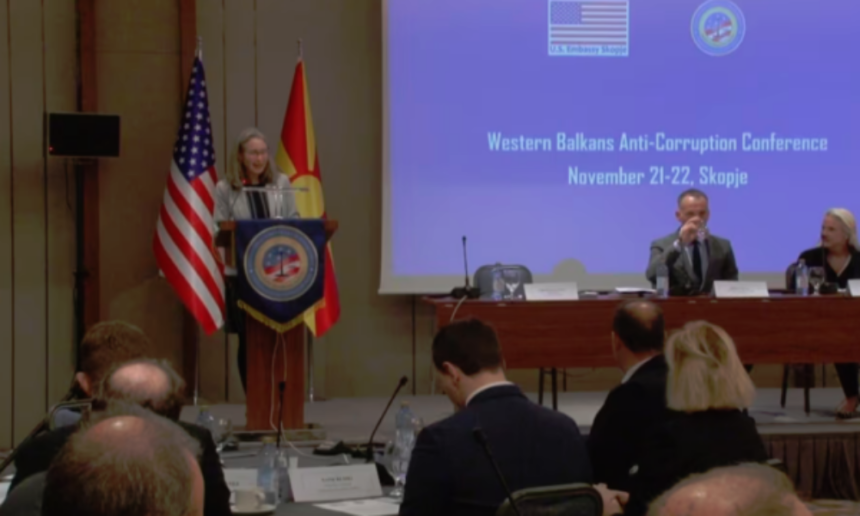A major conference focusing on the fight against corruption is being held in Skopje, with participation from key stakeholders across the Western Balkans. Organized by the U.S. Embassy in North Macedonia and the Bureau of International Narcotics and Law Enforcement Affairs (INL), the event serves as a platform to exchange knowledge and best practices, while building regional partnerships in the ongoing battle against corruption. U.S. Ambassador Angela Aggeler emphasized the importance of creating a regional anti-corruption network to strengthen the collective efforts against this pervasive issue.
Key Participants and Discussion Topics
The first-ever Western Balkans Anti-Corruption Conference in Skopje brought together judicial experts, civil society representatives, and business leaders from the region, as well as American experts from INL. The conference is designed to foster collaboration and knowledge-sharing, with a focus on establishing a unified strategy to combat corruption in a coordinated manner across the region.
Ambassador Angela Aggeler highlighted that the fight against corruption has become a cornerstone of U.S. national security strategy, not only in the Balkans but globally. She underlined the need to move beyond punitive measures and focus on empowering those who work tirelessly every day to protect justice, integrity, and truth.
“We must support those who choose action over silence, confrontation over retreat, courage over fear,” said Ambassador Aggeler, calling for the creation of a robust regional network to support anti-corruption initiatives.
Regional Cooperation and Building Trust
Ambassador Aggeler also commended the launch of the judicial network in North Macedonia, which brings together professionals from the criminal justice sector to share expertise, build mutual trust, and strengthen collaboration. She expressed confidence that this initiative could serve as a model for the entire region, encouraging similar efforts in neighboring countries.
“The United States stands firmly with those who support democratic principles and fight corruption. Together, through cooperation, courage, and commitment, I am confident we will achieve our shared mission,” she added.
Political Leadership: A Call for Accountability
Arben Fetai, Deputy Prime Minister of North Macedonia responsible for Good Governance, addressed the critical challenge of corruption facing the country. Fetai described corruption as a “multifaceted destructive force” that undermines economic, political, legal, and social systems. He stressed that corruption erodes public trust, misappropriates vital resources, and jeopardizes the fundamental values of democracy and human rights.
“Corruption has permeated every corner of our society,” Fetai declared, “threatening the rule of law, destabilizing our social structures, and eroding the core democratic values that bind us together as a nation.” He went on to emphasize the importance of ensuring social security and institutional integrity, stating that these are at risk if corruption continues unchecked.
Fetai affirmed that the government, together with international partners, is committed to creating strong mechanisms to prevent corruption and hold corrupt individuals accountable. “No one is above the law,” he insisted, indicating that changes to the country’s criminal code, in line with European and international standards, are in the works to move the country forward.
International Pressure on Corruption
North Macedonia has long struggled with high levels of corruption across various sectors, including the judiciary, healthcare, and law enforcement. International criticism has been vocal, especially regarding systemic corruption. Last year, the United States imposed travel bans on Koço Angjushev, the former Deputy Prime Minister of North Macedonia, and his family due to their involvement in significant corruption activities. This decision followed similar sanctions against prominent figures such as Jordan Kamčev, a businessman from Skopje, and Ramiz Merko, the mayor of Struga.
In addition to these sanctions, U.S. authorities have continued to place individuals on the U.S. Department of State’s “unwanted” list, signaling ongoing scrutiny and pressure on North Macedonia to tackle corruption effectively.
Ambassador Aggeler informed the media that U.S. authorities are actively discussing the inclusion of additional individuals from both North Macedonia and the broader region on this list, sending a clear message about the U.S. commitment to supporting anti-corruption efforts.
Conclusion: A Unified Approach to Corruption
The conference in Skopje marks a significant step towards regional cooperation in the fight against corruption. By bringing together key stakeholders from across the Western Balkans, the event highlights the shared responsibility of governments, civil society, and the international community to tackle corruption as a common threat. With the U.S. firmly behind the efforts to strengthen the rule of law and enhance governance in the region, the fight against corruption remains a priority on both national and international agendas.







